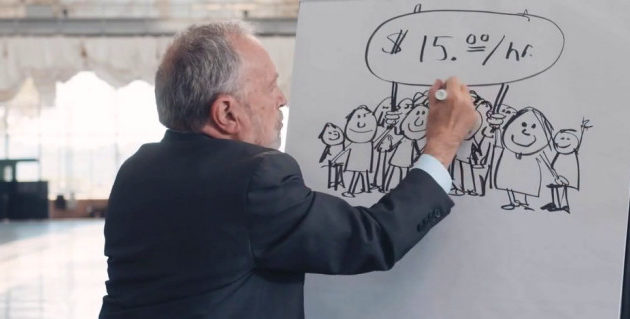Reich Is Wrong on the Minimum Wage by DONALD BOUDREAUX
Watching Robert Reich’s new video in which he endorses raising the minimum wage by $7.75 per hour – to $15 per hour – is painful. It hurts to encounter such rapid-fire economic ignorance, even if the barrage lasts for only two minutes.
Perhaps the most remarkable flaw in this video is Reich’s manner of addressing the bedrock economic objection to the minimum wage – namely, that minimum wage prices some low-skilled workers out of jobs.
Ignoring supply-and-demand analysis (which depicts the correct common-sense understanding that the higher the minimum wage, the lower is the quantity of unskilled workers that firms can profitably employ), Reich asserts that a higher minimum wage enables workers to spend more money on consumer goods which, in turn, prompts employers to hire more workers.
Reich apparently believes that his ability to describe and draw such a “virtuous circle” of increased spending and hiring is reason enough to dismiss the concerns of “scare-mongers” (his term) who worry that raising the price of unskilled labor makes such labor less attractive to employers.
Ignore (as Reich does) that any additional amounts paid in total to workers mean lower profits for firms or higher prices paid by consumers – and, thus, less spending elsewhere in the economy by people other than the higher-paid workers.
Ignore (as Reich does) the extraordinarily low probability that workers who are paid a higher minimum wage will spend all of their additional earnings on goods and services produced by minimum-wage workers.
Ignore (as Reich does) the impossibility of making people richer simply by having them circulate amongst themselves a larger quantity of money.
(If Reich is correct that raising the minimum wage by $7.75 per hour will do nothing but enrich all low-wage workers to the tune of $7.75 per hour because workers will spend all of their additional earnings in ways that make it profitable for their employers to pay them an additional $7.75 per hour, then it can legitimately be asked: Why not raise the minimum wage to $150 per hour? If higher minimum wages are fully returned to employers in the form of higher spending by workers as Reich theorizes, then there is no obvious limit to the amount by which government can hike the minimum wage before risking an increase in unemployment.)
Focus instead on Reich’s apparent complete ignorance of the important concept of the elasticity of demand for labor. This concept refers to the responsiveness of employers to changes in wage rates. It’s true that if employers’ demand for unskilled workers is “inelastic,” then a higher minimum wage would indeed put more money into the pockets of unskilled workers as a group. The increased pay of workers who keep their jobs more than offsets the lower pay of worker who lose their jobs. Workers as a group could then spend more in total.
But if employers’ demand for unskilled workers is “elastic,” then raising the minimum wage reduces, rather than increases, the amount of money in the pockets of unskilled workers as a group. When the demand for labor is elastic, the higher pay of those workers fortunate enough to keep their jobs is more than offset by the lower pay of workers who lose their jobs. So total spending by minimum-wage workers would likely fall, not rise.
By completely ignoring elasticity, Reich assumes his conclusion. That is, he simply assumes that raising the minimum wage raises the total pay of unskilled workers (and, thereby, raises the total spending of such workers).
Yet whether or not raising the minimum wage has this effect is among the core issues in the debate over the merits of minimum-wage legislation. Even if (contrary to fact) increased spending by unskilled workers were sufficient to bootstrap up the employment of such workers, raising the minimum wage might well reduce the total amount of money paid to unskilled workers and, thus, lower their spending.
So is employers’ demand for unskilled workers more likely to be elastic or inelastic? The answer depends on how much the minimum wage is raised. If it were raised by, say, only five percent, it might be inelastic, causing only a relatively few worker to lose their jobs and, thus, the total take-home pay of unskilled workers as a group to rise.
But Reich calls for an increase in the minimum wage of 107 percent! It’s impossible to believe that more than doubling the minimum wage would not cause a huge negative response by employers.
Such an assumption – if it described reality – would mean that unskilled workers are today so underpaid (relative to their productivity) that their employers are reaping gigantic windfall profits off of such workers.
But the fact that we see increasing automation of low-skilled tasks, as well as continuing high rates of unemployment of teenagers and other unskilled workers, is solid evidence that the typical low-wage worker is not such a bountiful source of profit for his or her employer.
Reich’s video is infected, from start to finish, with too many other errors to count. I hope that other sensible people will take the time to expose them all.
Donald Boudreaux is a professor of economics at George Mason University, a former FEE president, and the author of Hypocrites and Half-Wits.
EDITORS NOTE: Here’s how Reich cherry-picked his data to claim that the minimum wage is “historically low” right now; here’s why Reich is wrong about wages “decoupling” from productivity; here’s why Reich is wrong about welfare “subsidizing” low-wage employers; here’s why Reich is wrong that Walmart raising wages proves that the minimum wage “works”; Reich is wrong (again) about who makes minimum wage; and here’s a collection of recent news about the damage minimum wage hikes have caused.
This post first appeared at Cato.org, while Cafe Hayek was down for repairs.




Trackbacks & Pingbacks
[…] “Reich is Wrong on the Minimum Wage,” by Donald Boudreaux […]
Comments are closed.